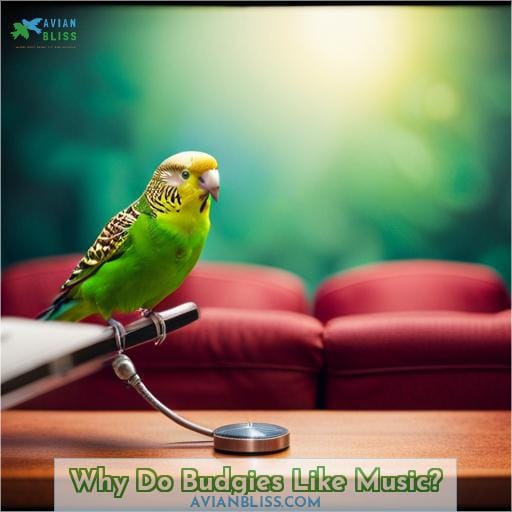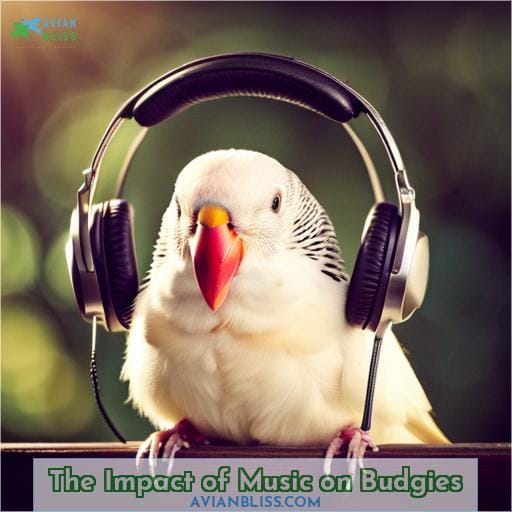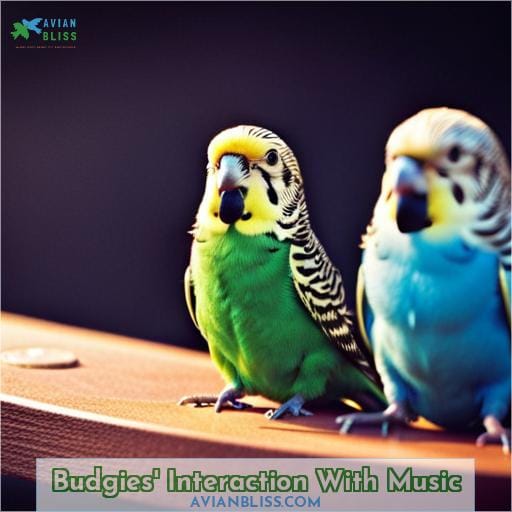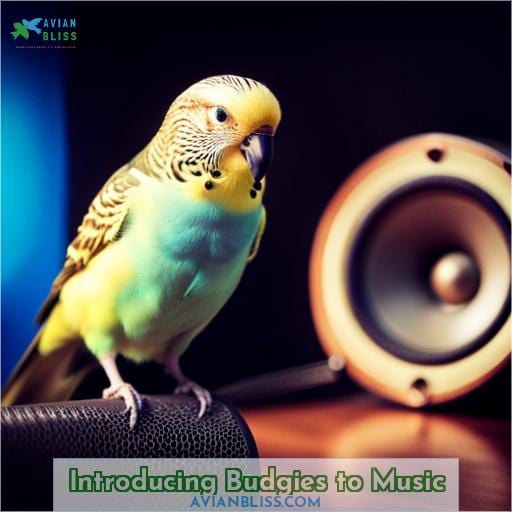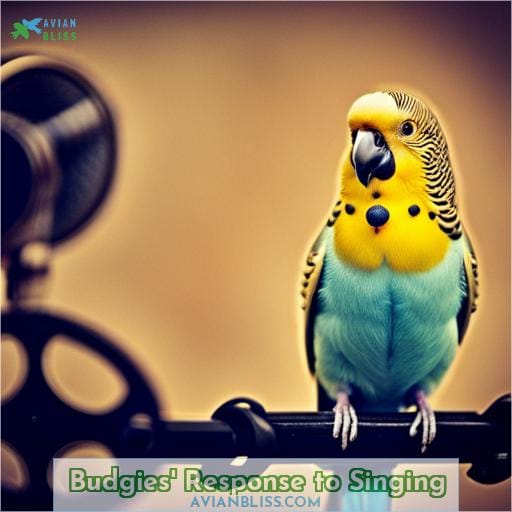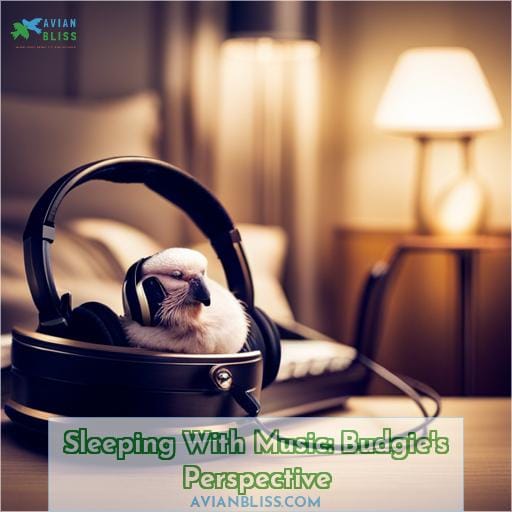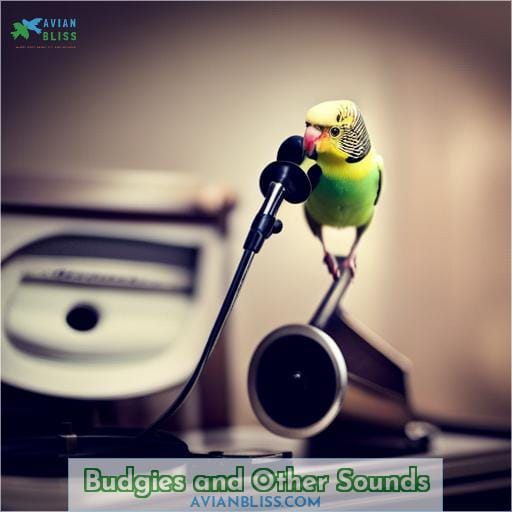This site is supported by our readers. We may earn a commission, at no cost to you, if you purchase through links.
 Imagine having a feathered friend who loves music just as much as you do. Budgies, also known as parakeets, have an innate appreciation for melodies and beats. In fact, their genetic predisposition and social nature make them naturally inclined to enjoy music.
Imagine having a feathered friend who loves music just as much as you do. Budgies, also known as parakeets, have an innate appreciation for melodies and beats. In fact, their genetic predisposition and social nature make them naturally inclined to enjoy music.
But what types of tunes do they prefer? And how does it affect their well-being? Join us on a fascinating journey into the world of budgies and music to discover why these little birds can’t help but groove along with the rhythm.
Table Of Contents
- Key Takeaways
- Why Do Budgies Like Music?
- The Impact of Music on Budgies
- Preferred Music Genres for Budgies
- Disliked Music for Budgies
- Budgies’ Interaction With Music
- Introducing Budgies to Music
- Budgies’ Response to Singing
- Sleeping With Music: Budgie’s Perspective
- Budgies and Other Sounds
- Frequently Asked Questions (FAQs)
- Can budgies differentiate between different genres of music?
- Are there any specific songs or artists that budgies tend to prefer?
- Can budgies develop a dislike for certain types of music over time?
- How does music impact budgies’ behavior and emotions?
- Is there a recommended volume level for playing music around budgies?
- Conclusion
Key Takeaways
- Budgies enjoy music, particularly calming instrumentals and gentle vocals.
- They may dislike loud and intense genres like rock or heavy metal.
- Budgies express their enjoyment of music through positive signs such as chirping, mimicking melodies, beak grinding, and whistling.
- Dancing to music allows budgies to express themselves, engage in physical exercise, and mentally stimulate themselves through learning new sounds and movements.
Why Do Budgies Like Music?
Budgies have a natural inclination to enjoy music due to their genetic predisposition and social nature.
As highly social birds, they’re accustomed to the sounds of their flock members, which includes vocalizations and various noises. This familiarity with auditory stimuli makes budgies receptive to music, as it triggers neural responses that influence their emotions and behaviors.
Genetic Predisposition to Enjoy Music
You may be wondering why budgies have such a strong affinity for music. Well, it turns out that their love for tunes might’ve a genetic influence.
Budgies, also known as parakeets, are sociable creatures with evolutionary music preferences ingrained in their DNA. Their neurological responses to music can be attributed to the alpha synuclein gene, which plays a role in musical development and cross-species musicality.
So next time you see your budgie bopping its head or chirping along to your favorite song, remember that it’s not just coincidence – there’s actually some science behind their melodious joy!
Social Nature and Familiarity With Flock Sounds
As we delve deeper into why budgies love music, it’s important to recognize their social nature and the familiarity they’ve with sounds from their flock.
Budgies are highly social birds that form strong bonds with their fellow flock members. They communicate through various vocalizations, including chirping and mimicry of other bird species.
This natural inclination towards auditory communication extends to their enjoyment of music. The familiar sounds in music resonate emotionally with budgies, creating a sense of belonging and comfort as they listen to different genres and develop unique musical tastes.
The Impact of Music on Budgies
When it comes to budgies and music, the impact goes beyond just enjoyment. Music has a profound effect on their emotions and behaviors, shaping their well-being in various ways. Understanding how music influences budgies can help create an enriching environment that promotes their mental and emotional health.
Emotional and Behavioral Responses to Music
Connect with your budgie by noticing how soothing music relaxes its body and upbeat songs make it chirp and dance happily.
- Calming classical music promotes mimicry mastery as budgies chirp along to the melodies.
- Fast-paced pop rhythms create emotional harmony, encouraging animated budgie dance dynamics.
- Try different genres to uncover preferences, but avoid distressing heavy metal.
- Music modulates budgie moods, so tailor tunes to encourage sleep serenity or playful interaction.
Influence of Music on Budgie Well-being
Regular exposure to music positively impacts budgie well-being, enhancing their emotional and behavioral responses.
Music therapy has been found to be a valuable tool in promoting the overall health and happiness of these delightful creatures. It provides them with behavioral enrichment, engaging their senses and stimulating their minds.
The melodic comfort offered by music creates a sense of well-being harmony for budgies, resonating with them on an emotional level.
However, it’s important to note that loud music can cause stress in budgies, so introducing them gradually to different genres is recommended based on studies conducted at the University of Helsinki.
Preferred Music Genres for Budgies
When it comes to music genres that budgies prefer, calming instrumentals and gentle vocals are highly favored.
Budgies are drawn to steady beats found in classical, R&B, and pop genres.
These types of music create a soothing environment for budgies while also engaging their senses with melodic tunes.
Calming Instrumentals and Gentle Vocals
When it comes to preferred music genres for budgies, they’ve a particular affinity for calming instrumentals and gentle vocals.
Budgies are drawn to melodic preferences that offer serenity and soothing sounds.
Calm, quiet melodies with instrumental serenity resonate well with these birds.
Gentle harmonies and soft vocals create a comforting environment that appeals to their sensitive nature.
Additionally, budgie vocal mimicry allows them to connect with human speech in music, further enhancing their enjoyment of favorite tunes.
Soothing bird songs combined with calming instrumentals create an ideal musical experience for these parakeets’ relaxation and sleep time.
Steady Beats in Classical, R&B, and Pop Genres
Do budgies prefer music genres with steady beats, such as classical, R&B, and pop? Absolutely!
When it comes to melodic preferences and rhythmic reactions, these feathered friends show a clear affinity for certain genres.
- Steady Beats: Budgies are drawn to music with consistent rhythms that provide a sense of stability.
- R&B and Pop: The catchy beats found in R&B and pop songs captivate budgies, making them chirp along in delight.
- Individual Tastes: Just like humans have unique musical preferences, each budgie may have its own favorite genres within the realm of steady beats.
Their vocalization patterns and behavioral indicators indicate that classics like classical or contemporary hits from the likes of Beyoncé can truly strike a chord with our avian companions’ musical inclinations.
Disliked Music for Budgies
Let’s move on to discuss the topic of musical genres that budgies generally dislike.
Some loud and intense genres like rock or heavy metal tend to be too much for budgies. However, individual budgies may have different tastes, and with gradual exposure even gentle rock songs can become enjoyable over time.
Loud and Intense Genres Like Rock and Heavy Metal
Therefore, you’ll find your budgies dislike loud and intense genres like rock and heavy metal, as the unpredictable nature and sheer volume tend to stress them out. Their auditory preference leans toward calmer, more melodic tunes with steady beats.
However, by gradually exposing budgies to livelier music and closely observing individual reactions, you can experiment to determine if certain heavy genres appeal to them.
Providing a retreat from any overly noisy environments allows budgies to regulate sensory stimulation and avoid excessive stress from music.
Individual Variations and Exceptions
You’ll find some budgies actually enjoy gentler rock songs if they’re gradually exposed, contradicting the general dislike for rock music.
There are also exceptions to the preference for gentle vocals and steady beat, with some budgies liking pop music and reacting to musical mistakes.
Your budgie may have favorite songs, so experiment with different genres and see what they enjoy.
Budgies’ Interaction With Music
You may notice your budgie chirping along with music they enjoy, mimicking the melody.
Male budgies in particular enjoy mimicking complex sounds, including music.
They may even spontaneously dance to certain songs, developing unique budgie rhythms.
Expressive Behavior Like Chirping and Mimicking Melodies
Budgies express their enjoyment of music through positive signs, like:
- Chirping
- Mimicking melodies
- Beak grinding
- Whistling
They may also exhibit negative signs, like:
- Loose feathers
- Slicked-back feathers
- Shaking,
if they dislike a particular song.
Dancing and Development of Unique Rhythms
As budgies interact with music, they spontaneously begin to dance and develop their own unique rhythms. This behavior isn’t only entertaining but also serves important purposes in their natural behavior and flock dynamics.
Dancing allows budgies to express themselves, engage in physical exercise, and mentally stimulate themselves through learning new sounds and movements.
It also promotes social bonding within the flock as they synchronize their dances together.
The cultural significance of dancing in budgie culture highlights its importance as a form of communication and expression among these charismatic birds.
Introducing Budgies to Music
When introducing budgies to music, it’s important to start with calming tunes and gradually expose them to diverse genres.
Begin by playing soft instrumentals or gentle vocals that create a soothing environment for your budgie.
As they become more comfortable, you can experiment with different types of music while observing their reactions and preferences.
This gradual approach will help ensure a positive experience and foster a deeper bond between you and your feathered friend.
Gradual Exposure to Diverse Genres
When introducing budgies to music, it’s important to gradually expose them to diverse genres, allowing them time to acclimate and develop their own preferences. This approach ensures a calming and soothing experience for your feathered friends.
Here are three key reasons why gradual exposure is beneficial:
- Consistent and predictable introduction of varied music genres creates an engaging and stimulating environment for budgies.
- Familiar tunes provide comfort during the transition, making the process more enjoyable.
- Diverse musical styles help expand their auditory experiences, promoting cognitive development in a fun way.
By following this approach, you can create an enriching musical journey for your beloved budgie companions.
Starting With Calming Tunes and Progressing to Others
Since budgies are naturally drawn to music, introducing them to calming tunes is a great way to start.
When selecting music, consider budgie preferences and reactions.
Play music at a low to moderate volume to avoid stress and anxiety.
Gradually incorporate energetic genres as the budgie becomes accustomed to the calming melodies.
Monitor budgie response like chirping or dancing to identify musical preferences.
With proper music selection and training, budgies can mimic tunes, enhancing their well-being and strengthening their bond with you.
Adjust music choices based on each budgie’s disposition for optimal results.
Budgies’ Response to Singing
Budgies enjoy and respond positively when their human companions sing to them. They’ll often sing along, mimicking the tones and rhythms they hear. This shared musical experience can strengthen the bond between budgie and human, integrating the bird into the family.
Enjoyment of Human Singing and Mimicry
You’ll notice your budgie become more engaged and excited when you sing or whistle tunes to ’em, as they love mimicking human vocalizations to integrate into the flock.
Budgies have a natural affinity for singing and mimicry, responding with positive reactions to your melodic outbursts.
They enjoy learning new songs through mimicry and will eagerly try their best to imitate specific phrases that catch their attention.
Singing becomes not only a form of entertainment but also a bonding activity between you and your feathered friend.
Budgies are good listeners who appreciate the joyous melodies brought by human voices.
Integration With Human Family Through Singing
To integrate budgies into your human family, sing to them and witness their enjoyment.
Singing creates a calming effect on budgies, helping them feel connected and bonded with you. Budgies have a natural inclination for mimicry, and when they hear you singing, they may attempt to imitate the melodies or even join in with chirps of their own.
This interaction through music strengthens the connection between you and your feathered friend while providing opportunities for socialization.
So go ahead, serenade your budgie with heartfelt tunes and watch as they become an integral part of your human family dynamic!
Sleeping With Music: Budgie’s Perspective
When it comes to sleeping with music, budgies have a unique perspective.
While they enjoy music during their waking hours, the impact of music on their sleep patterns is important to consider.
Budgies generally prefer silence during sleep as it allows them to stay alert and aware of potential threats in their environment.
Some budgies may be able to tolerate low-volume background music while others may find it too immersive and hinder their ability to rest peacefully.
Impact of Music on Budgie Sleep Patterns
One interesting thing you’ll notice is that music can be too immersive and may prevent your budgies from sleeping.
Budgies associate background noise with a lively flock during the daytime. However, silence is preferred at night to help them stay alert to potential threats.
While some budgies can sleep through low-volume music, it’s best to avoid prolonged exposure.
Be mindful of music volume levels, types, duration and frequency as these impact budgie sleep cycles.
Preference for Silence During Sleep
Budgie’s Perspective:
Because you’re used to background noise while awake, you’ll want quiet when sleeping so you can stay alert to potential threats.
Your need for darkness and sound sensitivity play a role in your preference for silence during sleep.
In the wild, where predators lurk, restful sleep is crucial for survival. It aligns with your natural instincts as prey animals.
So when it comes to bedtime tunes, it’s best to turn off the music and provide a peaceful environment that allows you to recharge and stay vigilant while catching some Z’s!
Budgies and Other Sounds
You’re often amazed by how your budgie reacts excitedly to sounds like the vacuum cleaner or toilet flush. It’s fascinating to see their immediate response and engagement with these everyday noises. As an avian veterinarian, I can tell you that budgies have a keen sense of hearing and are highly attuned to their environment.
- Reaction to Vacuum Cleaner: Budgies may exhibit curiosity and excitement when they hear the sound of a vacuum cleaner. They might start chirping, fluff up their feathers, or even mimic the noise.
- Response to Toilet Flush: The flushing sound seems intriguing for many budgies as it resembles running water in nature which is part of their natural habitat routine such as drinking or bathing activities.
- Singing and Whistling Along: Budgies have an inherent love for singing and whistling tunes, mimicking human voices or other bird calls they hear around them. Their ability to imitate songs makes them popular pets among music lovers!
- Chirping in Delightful Harmony: Budgie owners know that chirping is one way these feathered friends communicate happiness! Soothing melodies make your buddy sing along with joyous chirps creating beautiful harmony between humans & birds.
Understanding how your beloved pet responds positively towards different sounds helps create a bond between both parties while providing enrichment opportunities for mental stimulation through exposure within safe boundaries at home ensuring well-being overall.
Frequently Asked Questions (FAQs)
Can budgies differentiate between different genres of music?
Budgies possess a remarkable ability to differentiate between different genres of music. Their exceptional hearing allows them to perceive subtle tone and rhythm differences, influencing their preferences and responses.
Are there any specific songs or artists that budgies tend to prefer?
Do budgies have specific songs or artists they prefer?
While individual preferences may vary, budgies generally enjoy calming instrumentals and gentle vocals.
They can also be drawn to upbeat tunes with a steady beat.
Can budgies develop a dislike for certain types of music over time?
Yes, budgies can develop a dislike for certain types of music over time. Just like humans, they’ve individual preferences and may not enjoy genres that are too loud or intense for their sensitive ears.
How does music impact budgies’ behavior and emotions?
Music has a profound impact on budgies’ behavior and emotions.
As an avian veterinarian, I’ve seen them perk up to soothing melodies like birds flocking together under the warm sun.
But loud music can ruffle their feathers and cause stress, just like a gusty wind disrupting their peaceful flight.
Choose your tunes wisely!
Is there a recommended volume level for playing music around budgies?
To ensure a comfortable environment for your budgies, play music at a moderate volume.
Gradually introduce calming tunes before exploring different genres to gauge their response and preferences.
Conclusion
To conclude, budgies have a natural affinity for music, thanks to their genetic predisposition and social nature. Music has a significant impact on their emotional and behavioral responses, ultimately enhancing their well-being.
Budgies prefer calming instrumentals and gentle vocals, as well as steady beats found in classical, R&B, and pop genres. However, they tend to dislike loud and intense genres like rock and heavy metal.
Budgies interact with music by expressing themselves through chirping, mimicking melodies, and even developing unique rhythms. Gradual exposure to diverse genres and integrating music into their lives can bring joy and enrichment to these feathered friends.

